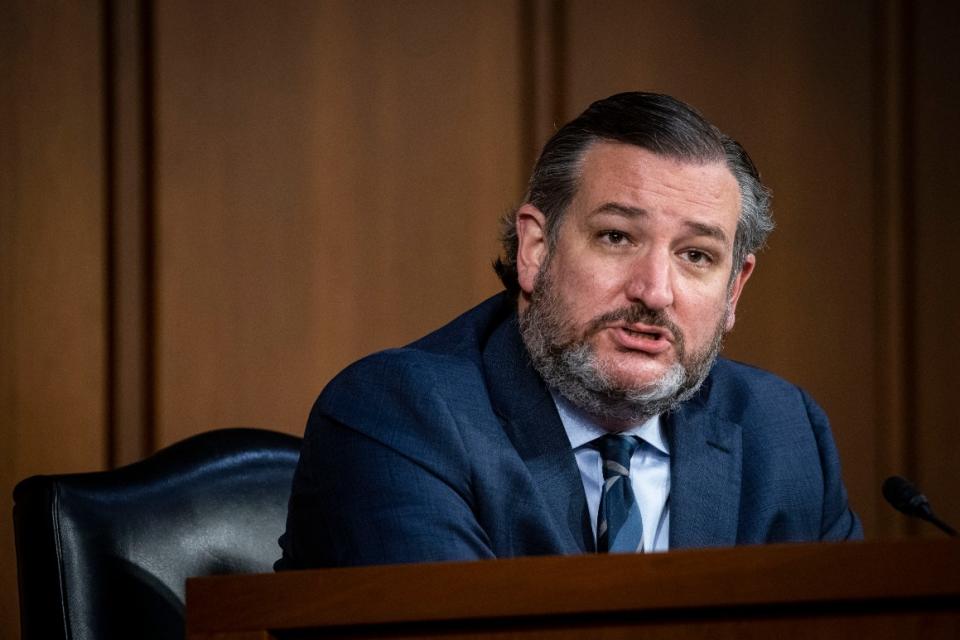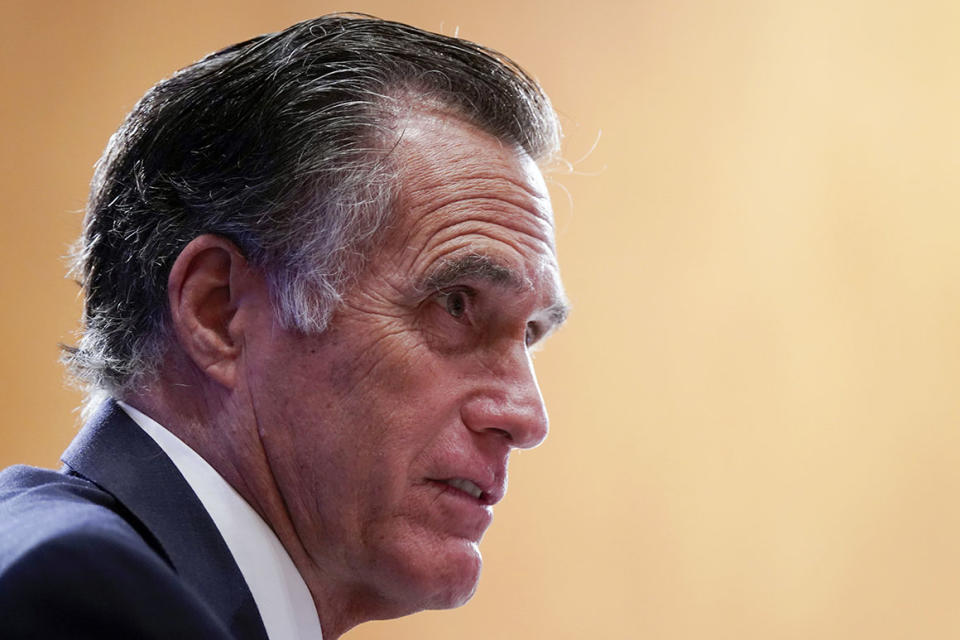A tough-on-China GOP is split on whether to boycott the China Olympics
President Joe Biden is under growing pressure from hawkish Republicans to use the 2022 Winter Olympics to punish the Chinese government over its human rights abuses.
But even within the GOP, there’s disagreement over how far to push.
Some are calling on Biden to outright boycott the Beijing Games, which China is hosting. Others say they oppose boycotts, arguing that only the athletes get punished. Many are instead pressing Biden to push the International Olympic Committee to revoke China’s role as host and stage the Games in another country — or at least to delay the competition.
The Biden administration, meanwhile, has been unwilling to take a stand on the subject, but it says it is talking to other countries about it. Secretary of State Antony Blinken and National Security Adviser Jake Sullivan are due to meet Chinese officials in Alaska next week, and the issue could arise then.
The Olympics question offers a window into the increasingly complicated debate in Washington over how to respond to the rise of communist-led China and its documented human rights abuses, especially its crackdown on Uighur Muslims and suppression of democracy activists in Hong Kong.
While there’s broad consensus on the left and right that Beijing’s authoritarian vision, military build up, and economic prowess poses a geopolitical threat to Western democracy, there’s less of a consensus on exactly what tactics are best to counter that challenge — even among Republicans, who have broadly taken up a tough-on-China mantle ahead of the 2024 presidential primaries.

A boycott would be “a serious mistake,” potential 2024 contender Sen. Ted Cruz (R-Texas) said in a brief interview with POLITICO, citing what he described as former President Jimmy Carter’s “blunder” in boycotting the 1980 Olympics hosted by the Soviet Union. “I don’t think we should be punishing athletes who have spent their entire lives training. We should go to Beijing, compete, and win.”
But given that there’s less than a year left before the Winter Games commence, and the International Olympic Committee has shown no signs it’s willing to change the location, other Republicans say it’s time to start talking about pulling out.
“The IOC seems to be truly dug in on this issue, which is counter to their own code of ethics and morals,” said Rep. Michael Waltz (R-Fla.), one of the sponsors of a resolution that calls for a boycott if the Games aren’t moved. “I just don’t see how we turn a blind eye, literally, to what’s going on as we speak.”
The “what’s going on,” Waltz and other lawmakers said, includes Beijing’s detention and alleged abuse of more than 1 million Uighur Muslims in what the Biden administration has called a genocide; crackdown on civil liberties in Hong Kong; ongoing oppression of the people of Tibet; and a generally more oppressive political atmosphere in mainland China. Many U.S. lawmakers also allege that the Chinese Communist Party is covering up the truth about how the coronavirus pandemic began on its soil and spread throughout the world.
A five-ring circus
The 2022 Winter Games are scheduled for Feb. 4-20. They are set to be held just months after Japan hosts the Summer Games, which were delayed from 2020 because of the pandemic. A leading Japanese news agency reported this week that Japanese officials had decided to bar foreign spectators from the Summer Games because of Covid-19 fears.
The pandemic could still damage or delay Beijing’s plans to host the Winter Games next year, but the growing availability of vaccines has raised the odds the competition will go on as planned.
Sen. Marco Rubio (R-Fla.) — one of the most hawkish GOP voices on China — has signed on to a resolution championed by his fellow Florida GOP Sen. Rick Scott, which calls for the Winter Games to be taken away from China. But Rubio wasn’t willing to push for a boycott just yet.
“It’s a tough call,” he said in a brief interview. “I haven’t really made a decision on it. Because I feel bad for the athletes. I mean, ultimately they’re the ones that pay the price.… I mean, the ideal is you would find an alternative site to be able to host it. But that’s pretty tough to pull off.”

Rubio is considered a potential 2024 presidential contender. Already, some of his possible competitors for the GOP nomination have endorsed the idea of a boycott.
“We must boycott the 2022 Winter Olympics in China,” former South Carolina Gov. Nikki Haley wrote on Twitter. “It would be a terrible loss for our athletes, but that must be weighed against the genocide occurring in China and the prospect that empowering China will lead to even greater horrors down the road.”
Another likely 2024 contender, former Secretary of State Mike Pompeo, issued a similar call. Pompeo said that while in the Trump administration, he and others tried to convince the IOC to relocate the Games, but apparently had no luck. In one of his final acts as secretary, Pompeo declared that China was committing genocide against the Uighurs, a decision the Biden team has backed.
“In the end, we cannot allow American athletes to travel to Beijing and reward the Chinese Communist Party all the while that they (are) doing all of the nasty activity that they're engaged in,” Pompeo told conservative media host Hugh Hewitt.
Sen. Mitt Romney (R-Utah), who led the organizing committee for the 2002 Olympics in Salt Lake City, endorsed an “economic and diplomatic boycott” of the 2022 games, but said he wouldn’t go further than that.

“I think preventing our athletes from competing in something they’ve prepared for all their lives, with great sacrifice on their part and on the part of their families, would be a mistake,” Romney said in a brief interview.
The Biden administration is discussing various Olympics-related options with its allies and partners “at all levels,” State Department spokesperson Ned Price said Monday. The issue is coming up as part of broader discussions with America’s friends over how to establish a joint approach toward Beijing.
“Obviously, we’re talking about 2022, so I don’t have any specifics to share at the moment, but we are engaged very much in those consultations as we establish that shared approach,” Price told reporters.
The exact mechanics of an international boycott could prove complicated, involving various national Olympics committees, not to mention the athletes themselves. In 1980, the U.S. government under Carter warned American athletes that if they chose to compete they could be stripped of their passports.
China will ‘retaliate fiercely’
Democrats say that Biden is right to at least consider ways to use the Olympics to push China to change its behavior.
“It’s important that we use every opportunity to advance global support against what China is doing,” said Sen. Ben Cardin (D-Md.), a top member of the Senate Foreign Relations Committee. “I recognize it may be not a realistic path forward, but it’s certainly something we should be talking about.”
The possibility of a boycott has arisen in other countries, such as Canada and Australia. Dozens of human rights organizations, many of them representing groups like Tibetans, also have called for a boycott. But institutions that handle Olympics issues, such as the U.S. Olympic and Paralympic Committee, have reportedly shown no interest.
China has reacted to calls for a boycott with derision and threats, while insisting it is not mistreating the Uighurs or other groups highlighted by human rights activists. State-backed media isn’t backing down, either. “If any country is encouraged by extremist forces to take concrete actions to boycott the Beijing Winter Olympics, China will definitely retaliate fiercely. China certainly has the resources and means to do that,” argued an editorial in the Global Times.
Lessons unlearned
In 1980, when the Summer Games were hosted by Moscow, Carter insisted on a boycott in response to the Soviet Union’s invasion of Afghanistan. Some 65 countries joined the boycott, while 80 went ahead and participated.
U.S. allies Germany, Canada and Israel boycotted the event, but other allies, like Britain and Australia, sent athletes to compete. Four years later, the Soviet Union and other Eastern Bloc countries boycotted the Summer Games in Los Angeles.
Today, many view the 1980 boycott as largely unsuccessful. It was, after all, nearly another decade before the Soviet Union left Afghanistan. And many hopeful American athletes lost their shot at Olympic glory despite years of training.
Some former Trump administration officials favor participating in the 2022 Games as a platform to air concerns, perhaps in creative ways. Biden could, for instance, include Uighur-Americans as part of the official U.S. delegation. American athletes also could be encouraged to speak out against China’s oppressive policies.
“Staying in the Olympics can actually be a powerful vehicle to shine a light on their abuses, if we have the will,” Alex Gray, a Trump National Security Council official and China specialist now with the right-leaning American Foreign Policy Council, told POLITICO. “A boycott could backfire, but using the Games to highlight Xinjiang, Tibet, Christians, and more will be more effective as the whole world is watching.”

Another former Trump administration official said the U.S. should consider a boycott, but only as a last resort and “only if we can get other like-minded countries to join.” The former official also warned that athletes who protested Chinese human rights abuses risk running afoul of a vaguely worded national security law China imposed last year as part of its crackdown on Hong Kong.
Waltz pointed out that the world has agreed to participate in past Olympics in countries like Russia and China. Neither country’s government, Waltz said, improved its human rights record or international behavior afterward.
China hosted the 2008 Summer Games, drawing extraordinary global attention; in the years since it has only become more oppressive internally and aggressive internationally, Waltz said.
The 2014 Winter Games were held in Sochi, Russia, giving a grand stage to dictator Vladimir Putin. As those contests came to an end that February, Putin began his invasion of the Crimea region of Ukraine.
Waltz said he’s talking to some Democrats to try to get them on board, while stressing that everyone, including himself, would prefer that the Games simply be moved to “a country that’s not massacring its own people.”

